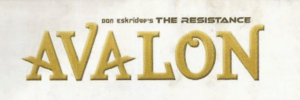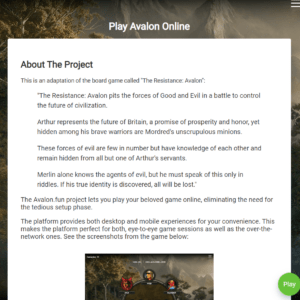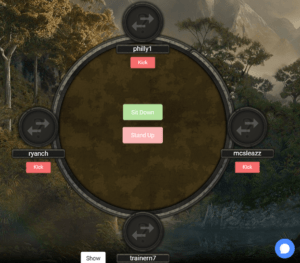
Critical play is an important skill necessary for any good game designer. For my first critical play analysis, I choose to look at Don Eskridge’s The Resistance: Avalon, or just Avalon for short. I played the multiplayer game with 4-5 other people on the online platform avalon.fun.

When you first enter the website, it shows this blurb about the game, but nothing about the actual rules or how it works. I don’t see player count or any guiding parameters, like do I need an account and the play button gets lost. I found this confusion continues into the game play because the game itself features no text, instructions, or narration. It made the experience confusing and everyone lost interest.
Eventually, we found the instructions and that the game was just like Secret Hitler, Mafia, and other deduction/spy games. The game is good for very large groups, 5 – 10 people, and is ideal for a quick party game to help break the ice. All players are assigned as good or evil. The objective is to pass 3 quests for your team, without necessarily knowing who is on what team.
 During the first 10 seconds of the game, each player is shown their own character, and if they are evil then they will be shown who else is evil. If they are merlin, they will also see who is evil. The evil people are indicated with a red circle around their icon.
During the first 10 seconds of the game, each player is shown their own character, and if they are evil then they will be shown who else is evil. If they are merlin, they will also see who is evil. The evil people are indicated with a red circle around their icon.
This just happens with no warning or instruction and it took several rounds for everyone to understand when they were evil and to tell who else was. It made the game seem more trivial to the people who were confused and less fun. Once everyone understood that, the full mechanics of the game were in play and people began to enjoy themselves.
The game itself is a great classic party game made for large groups. But this version really suffered due to its lack of instructions or signals detailing transitions or new game stages such as team building or the quest stage. It even took us a few rounds to understand how and when a quest failed. The computer aspect might have also ruined the experience because during voting people could just zone out on their laptop, while in the in-person physical versions of Secret Hitler I have played, people were more invested in the team building stages and negotiating.
A slightly different aspect of Avalon is the role of Merlin who knows who is evil but can not say anything. It feels boring and the role does not serve much of a purpose, especially compared to those of Morgana or Percival or in other deduction games. Giving Merlin more of an edge would have been more fun.



